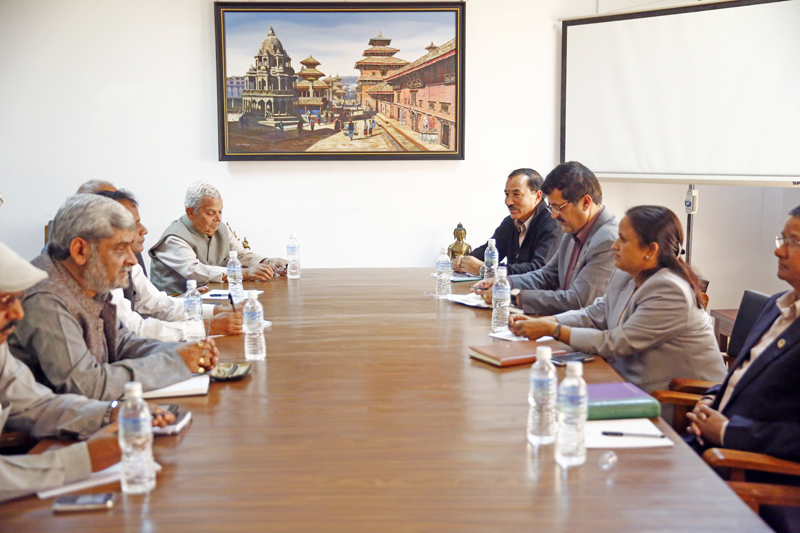Government, UDMF talks inconclusive
Kathmandu, October 25
Representatives of the government and United Democratic Madhesi Front held dialogue today but failed to reach any solution on constitutional issues.
The UDMF has been protesting for more than two months in the Tarai demanding amendments in the newly adopted constitution including the issue of provincial boundaries.
According to UDMF talks team member and Co-chair of Sadbhawana Party Laxman Lal Karna, there was no progress in talks today except for the formation of a two-member task force to implement the remaining conditions put forth by the UDMF.
Minister of Law, Justice and Parliamentary Affairs Agni Prasad Kharel and Vice-chair of Federal Socialist Forum-Nepal Lalbabu Raut are members of the task force.
The UDMF’s conditions include martyrdom status for those killed during protests; free treatment for the injured; compensation for the victims’ families; withdrawal of security forces from Tarai districts; and impartial and independent probe into the use of excessive force during protests.
Karna said they decided to hold other discussions on October 29 as government negotiators failed to state how they wanted to settle the question of boundaries.
“Today the government negotiators failed to propose how they wanted to amend the provincial boundaries to address our concerns. I hope they do it in the next meeting on October 29,” Karna said and added that talks could not be deemed to have progressed unless there was understanding to amend the boundaries of provinces.
Minister of General Administration Rekha Sharma, a government talks team member, however, said negotiations with UDMF representatives were positive. She said government negotiators asked the UDMF to withdraw its protests, but they were adamant on not doing so. Sharma said they told UDMF negotiators that both sides need to find a middle path on the boundary question.
UDMF has been saying provinces should be demarcated along the lines of the 10-province model prepared by the erstwhile State Restructuring Commission which suggested carving out two provinces in the Madhes. Sharma said as it would not be possible for negotiators to demarcate provincial boundaries at the negotiating table, they proposed forming a mechanism to deal with boundary issues, but UDMF negotiators said the issue must be finalised at the negotiating table.
“I feel UDMF leaders are sceptical about the intention of the ruling coalition. While non-implementation of some of the past pacts might have been a reason for this, both sides need to move ahead without becoming hostage to the past,” she added.
Sharma said the amendment bill had already been registered at the Parliament to amend constitutional provisions to ensure proportional representation. This bill will accept population as the main criteria for delineation of election constituencies.
Sharma also added that other issues could be worked out at the negotiating table.
UDMF talks team member Lalbabu Raut said the government had not fully implemented any of the five conditions set for talks and that the two-member task force was mandated to facilitate implementation.
He said there was no need for any kind of mechanism to settle the boundary question as the issue could be settled at the negotiating table if the ruling coalition wanted.
“We all know that these big parties rejected the past agreements. If they realise their mistake, I am sure we can reach a solution in minutes,” Raut added.






